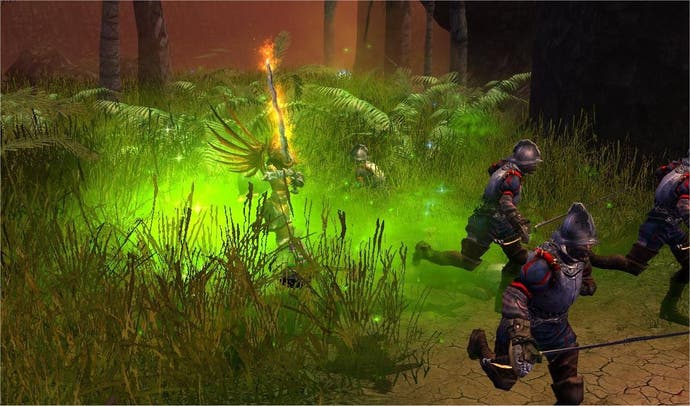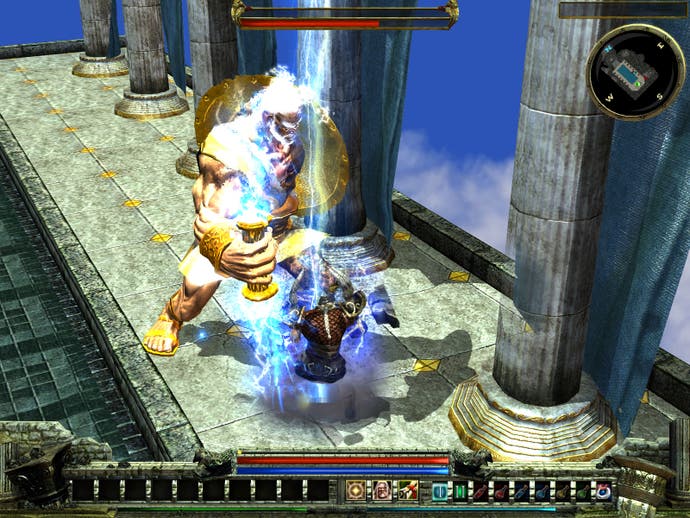Loki
A few tricks up its sleeve.
March of Progression
Indeed, even when it's falling back on relatively stereotypical action-RPG gameplay, Loki seems to have a few tricks to bring into play. Large outdoor areas are mixed in with traditional dungeons, and the game takes the pain out of traversing the world with teleport stones, which allow you to leap between previously discovered locations. Spells and attacks are placed in a bar on-screen, as you'd expect, but the ability to automatically fire them off in order using the left and right keys opens up the interesting possibility of creating and tweaking a chain of attacks based on cool-down times or status effects.
Playing through the first few hours of the game, other small tweaks to the formula become apparent, and look like being very welcome indeed over the course of a more lengthy play session. Any scenery that comes between your character and the camera becomes transparent, for example, so you never lose sight of what you're doing. A feature in the inventory screen called the "kiosk" looks like eliminating much of the frustration from managing your stock of items, too; it's essentially a recycle bin, allowing you to dump stuff you don't want in there, thus keeping it out of your main inventory screen. You can retrieve items, of course, but more usefully, you can also perform group operations, like selling the whole lot to a merchant. It's a nice touch which any fan of RPGs is likely to welcome.
The overall feeling you may be getting is that Loki is focused on tweaking without radically overhauling the hackandslash genre - and that's an entirely fair assessment. We've seen very little so far that can be described as radical in any way, but a combination of lovely, gritty-looking graphics and artwork with the kind of gameplay touches described above combine to make it into an enjoyable experience - even without any real innovation worth talking about.

The same design concepts extend into the game's character progression system, which is focused around the idea of worship. In each zone of the game, you can choose between three different gods to worship - each of whom will grant you various powers and spells as you continue to worship them. The quid pro quo is that you have to allocate a quarter of your experience points to worshipping; so by opting to worship nobody, you'll level up faster, but won't gain access to the new spells. It's a delicate balance to strike, but, again, it's more a refinement of existing systems than anything else - the whole three-gods decision isn't dissimilar to the three talent trees that exist for each class in World of Warcraft, for example.
Weapons and armour, meanwhile, are slightly more complex than you might expect from a hackandslash game - although certainly not sufficiently so to give headaches to anyone who's familiar with RPGs in general. Each weapon can be broken into two component parts, the grip and the blade, and recombined to make new weapons of your choosing, and every item can be reforged by a blacksmith, which boosts its stats or resistances in specific ways. So, for example, if you have an Iron helm, you can collect enough Gold to reforge the helm as a gold object, which will give it a better defence rating (and change its appearance). Some items can also be "inlaid" during the reforging process; so you might wish to inlay, for example, Sapphire on a chestplate to boost Ice resistance (just an example, by the way - our notes don't relate whether that's actually a real resistance).

So far, then, Loki is looking very much like a solid, likeable and extremely polished hackandslash RPG, with some lovely mythological elements and a few nice touches to the gameplay to give you a warm glow as you march through a few-dozen hours of play. However, there's one other element worth mentioning which might make a few of you sit up straight and pay attention (and stop flicking paper at each other down the back): online. Long a staple of the genre, Cyanide has decided to make online into a major feature of Loki, and to that end, has built in a veritable cornucopia of modes and functionality.
Duel modes and battle modes for up to eight players are pretty much par for the course, naturally, but Loki also boasts a six-player co-op mode spanning the entire single-player campaign. On top of that, there are also 20 different challenges designed specifically for co-op play - and an online leaderboard will show players their global rank. Cyanide is also taking cheating pretty seriously, and will have a "Closed" mode in operation which stores multiplayer characters on the developer's own servers, thus preventing them from being tampered with offline.
It's a fairly neat package of online features, which rounds out a game that looks well-pitched for any of the PC's many fans of hackandslash gameplay. We will, of course, be taking a more in-depth look at the worlds of Loki ahead of its launch on 24th August.





.png?width=291&height=164&fit=crop&quality=80&format=jpg&auto=webp)


